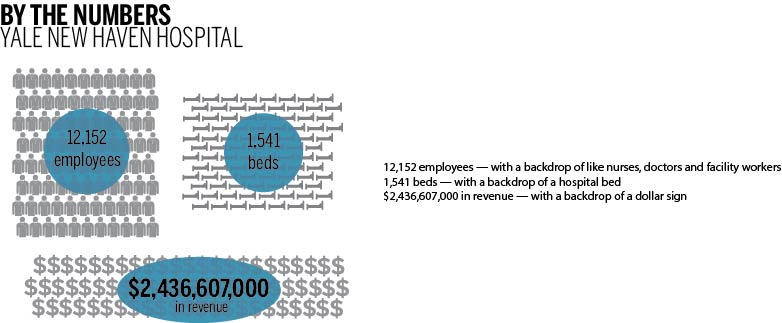
Since Gov. Dannel Malloy proposed the elimination of hospitals’ property tax exempt status in his new budget plan last week, Connecticut lawmakers and administrators have expressed ambivalence about using nonprofit taxation to close the looming deficit.
The proposed budget would grant cities and towns greater freedom to find more sources of revenue by lifting nonprofit hospitals’ exemption from paying property taxes. If confirmed, Connecticut’s municipalities would secure $212 million each year through the new tax. To compensate for the hospitals’ loss in revenue, the state would make available $250 million in Medicaid payments to the health care providers.
“Every year, there are so many moving pieces that have to fall into place,” City Hall spokesman Laurence Grotheer said. “This year is extraordinary in the dollar value of some of those pieces.”
Mayor Toni Harp supports Malloy’s call to diversify municipalities’ options as cities like New Haven try to find other avenues for generating revenue, Grotheer said. But Harp questioned whether taxing hospitals would work well with Yale New Haven Hospital, since much of Malloy’s plan counts on continued federal government payments to YNHH.
Of the $250 million in Medicaid payments, $162 million would come from federal aid, according to the budget. The remainder would come from the state.
If a property tax were levied, YNHH could later be “hung out” by the federal government if the government made fewer payments than anticipated — a likely probability given recent speculation of incoming cuts to Medicaid under President Donald Trump’s administration, Grotheer said.
State Senate President Pro Tempore Martin Looney, D-New Haven, echoed Harp’s thought process and expressed concerns about the reliability of the federally funded Medicaid stream. Harp fears that this situation could disrupt YNHH’s ability to function as a health care safety net for citizens and as one of the city’s leading employers, Grotheer said.
Other politicians in the Elm City have one answer for the proposed hospital tax: no.
Last summer, after state legislators targeted Yale University for an endowment tax payment, the New Haven Republican Town Committee convened several times to determine whether they could stand for this targeted taxation of nonprofit institutions, committee chairman Jonathan Wharton said. The committee decided that taxing these organizations was wrongful, but Wharton said he is not surprised the Malloy administration proposed the exemption lift.
“[As] opposed to going after hospitals or universities, they should find other alternatives beyond this,” Wharton said. “Quite frankly, this shouldn’t even be on the radar.”
State Rep. Dave Yaccarino, R-North Haven, expressed similar sentiments. He said Yale and YNHH already make voluntary payments to the local and state governments. In fact, Yale New Haven Health System already pays more than $200 million in taxes to the state, Vincent Petrini, the senior vice president of public affairs at YNHHS, said in an email statement to the News.
And if the hospitals were taxed, the tax burden could potentially fall on YNHH patients, Yaccarino said.
The burden of the tax will also have Morris Cove Alder Salvatore DeCola weighing the Board of Alders’ options as it deliberates Harp’s proposed city budget, which she will present in the upcoming weeks.
“It’s something that we’re going to have to think hard about,” DeCola said.
The hospital system recognizes that Connecticut is facing serious financial issues, but the health care provider, Petrini said, has “grave concerns” about Malloy’s proposal. Though Petrini said YNHHS is willing to explore other solutions, he said levying property taxes on nonprofit hospitals is a worrying precedent YNHHS cannot support.
Though officials’ concerns about the proposal remain, all will have to wait for the General Assembly to continue with its legislative process. The lawmaking body, Looney said, has just started its budget process and its subcommittees are examining the proposals.
“I’ll know more [about the hospital proposal] in the coming weeks,” Yaccarino said.







